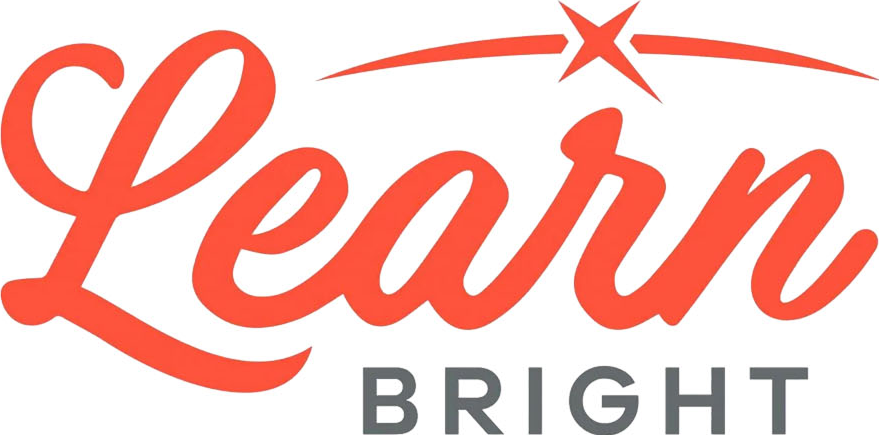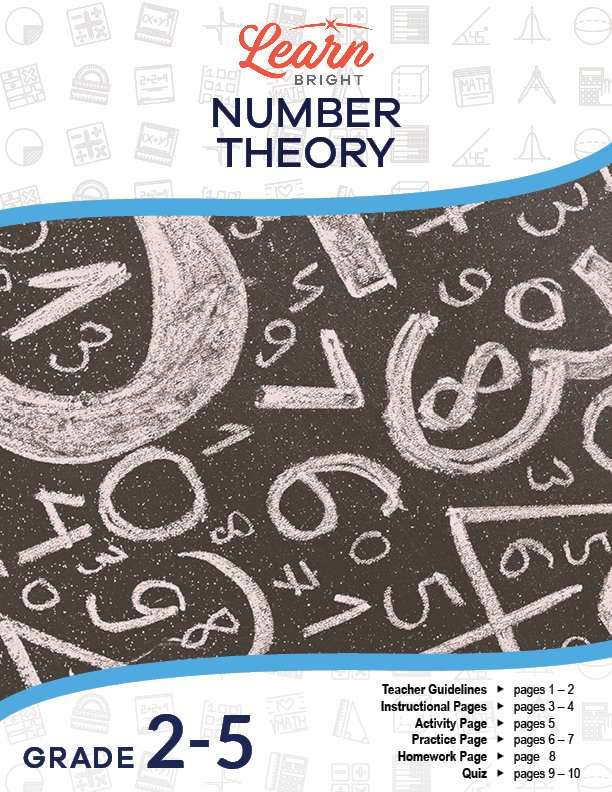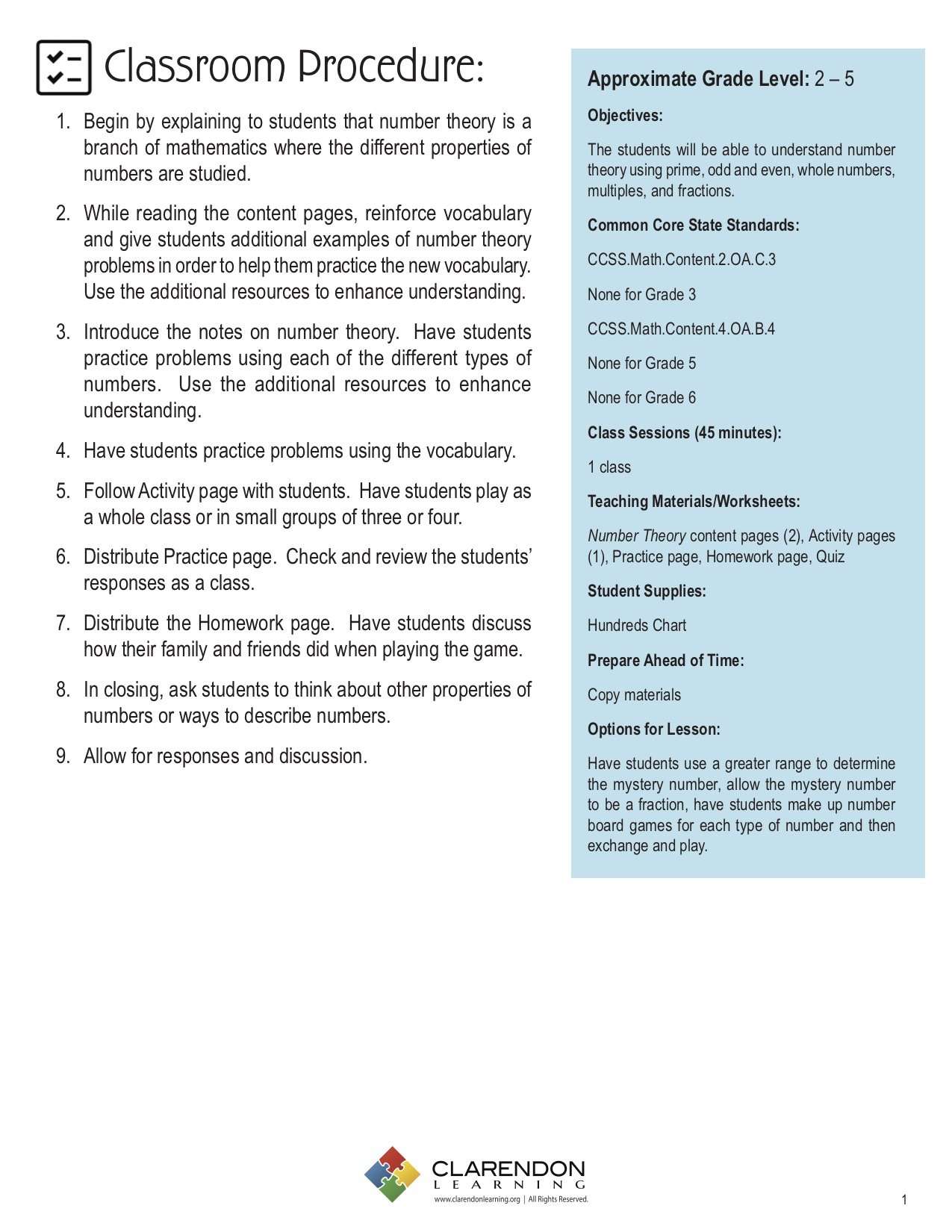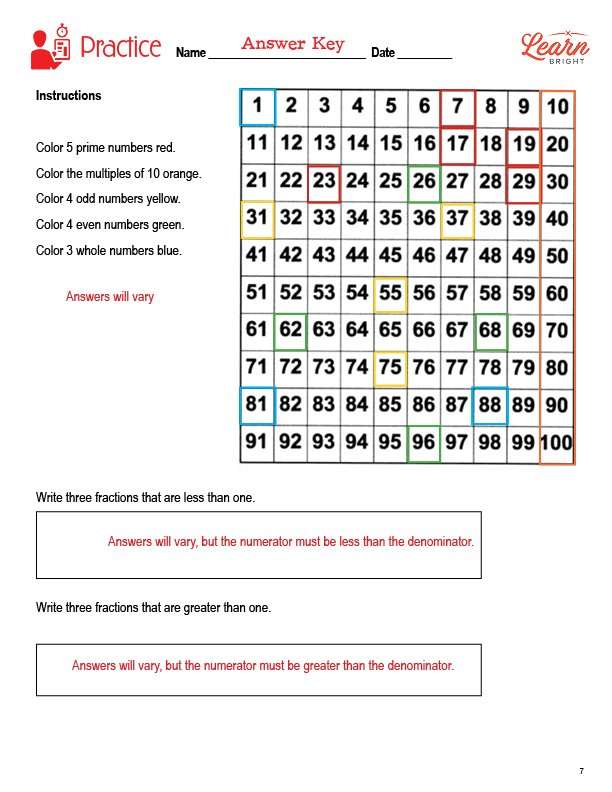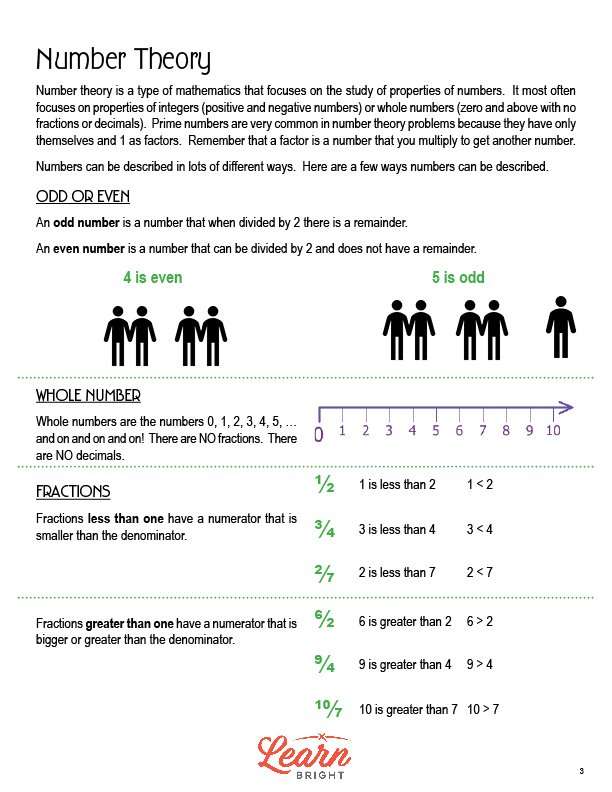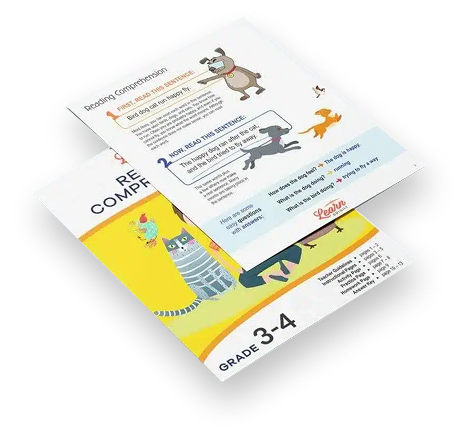Description
What our Number Theory lesson plan includes
Lesson Objectives and Overview: Number Theory teaches students all about number theory and prime, odd, even, and whole numbers and multiples and fractions. At the end of the lesson, students will be able to understand number theory using prime, odd and even, whole numbers, multiples, and fractions. This lesson is for students in 2nd grade, 3rd grade, 4th grade, and 5th grade.
Classroom Procedure
Every lesson plan provides you with a classroom procedure page that outlines a step-by-step guide to follow. You do not have to follow the guide exactly. The guide helps you organize the lesson and details when to hand out worksheets. It also lists information in the blue box that you might find useful. You will find the lesson objectives, state standards, and number of class sessions the lesson should take to complete in this area. In addition, it describes the supplies you will need as well as what and how you need to prepare beforehand.
Options for Lesson
Included with this lesson is an “Options for Lesson” section that lists a number of suggestions for activities to add to the lesson or substitutions for the ones already in the lesson. One optional addition to the lesson activity is to have your students use a greater range to determine the mystery number. You could also allow the mystery number to be a fraction. For another activity, you could have your students make up number board games for each type of number and then exchange and play.
Teacher Notes
The teacher notes page includes lines that you can use to add your own notes as you’re preparing for this lesson.
NUMBER THEORY LESSON PLAN CONTENT PAGES
Number Theory
The Number Theory lesson plan includes two content pages. Number theory focuses on the study of properties of numbers. Most often, it focuses on the properties of integers (positive and negative numbers) or whole numbers (zero and above without fractions or decimals). Number theory problems often include prime numbers because they only have themselves and 1 as factors. Factors are numbers that you multiply to get another number.
You can describe numbers in many different ways!
Odd or Even
Odd numbers are numbers that have a remainder when divided by 2. Even numbers are a number that do not have a remainder when divided by 2. For example, 4 is an even number and 5 is an odd number.
Whole Number
Whole numbers do not include fractions or decimals. For example, the numbers 0, 1, 2, 3, 4, 5, and so on are whole numbers.
Fractions
Fractions less than one have a smaller numerator than denominator. For example, 1/2 and 3/4 are fractions less than one. Fractions greater than one have a bigger numerator than denominator. For example, 6/2 and 9/4 are fractions greater than one.
Prime Numbers
Prime number can only be divided evenly by themselves and 1. They must be whole numbers greater than 1 and cannot be a fraction or a decimal. The lesson includes a chart that shows all of the prime numbers from 1 through 100. For example, 3 is a prime number because it can only be divided evenly by 1 and itself, 3. On the other hand, 8 is not a prime number because it can be divided evenly by 1, 2, 4, and itself, 8. Did you know that 2 is the only prime number that is even?
Multiples
You can think of multiples as skip counting by a whole number. They are the answer to the multiplication facts! For example, the multiples of 4 include 0 (0 x 4), 4 (1 x 4), 8 (2 x 4), and 12 (3 x 4). You can also have negative multiples. The negative multiples of 4 include -4 (-1 x 4), -8 (-2 x 4), and -12 (-3 x 4).
NUMBER THEORY LESSON PLAN WORKSHEETS
The Number Theory lesson plan includes four worksheets: an activity worksheet, a practice worksheet, a homework assignment, and a quiz. You can refer to the guide on the classroom procedure page to determine when to hand out each worksheet.
GUESS MY NUMBER ACTIVITY WORKSHEET
For the activity worksheet, students will guess a whole number between 1 and 100 that the teacher comes up with. The class can ask up to 20 yes or no questions to identify the number. The students will use a hundreds chart to keep track of the numbers they’ve eliminated. After the students identify the number, they will discuss the questions they asked and which questions could be helpful to ask in the future. They will then play the game again!
HUNDREDS CHART PRACTICE WORKSHEET
The practice worksheet asks students to color in the numbers on a hundreds chart according to their attributes. For example, they will color five prime numbers red and color the multiples of 10 orange. Next, they will write three fractions that are less than one and write three fractions that are greater than one.
NUMBER THEORY HOMEWORK ASSIGNMENT
For the homework assignment, students will play the activity game with their family or friends. This time, they will come up with the number and have their family or friends guess!
QUIZ
This lesson also includes a quiz that you can use to test students’ understanding of the lesson material. For the quiz, students will answer a few questions about the lesson material.
Worksheet Answer Keys
This lesson plan includes answer keys for the practice worksheet and the quiz. If you choose to administer the lesson pages to your students via PDF, you will need to save a new file that omits these pages. Otherwise, you can simply print out the applicable pages and keep these as reference for yourself when grading assignments.
